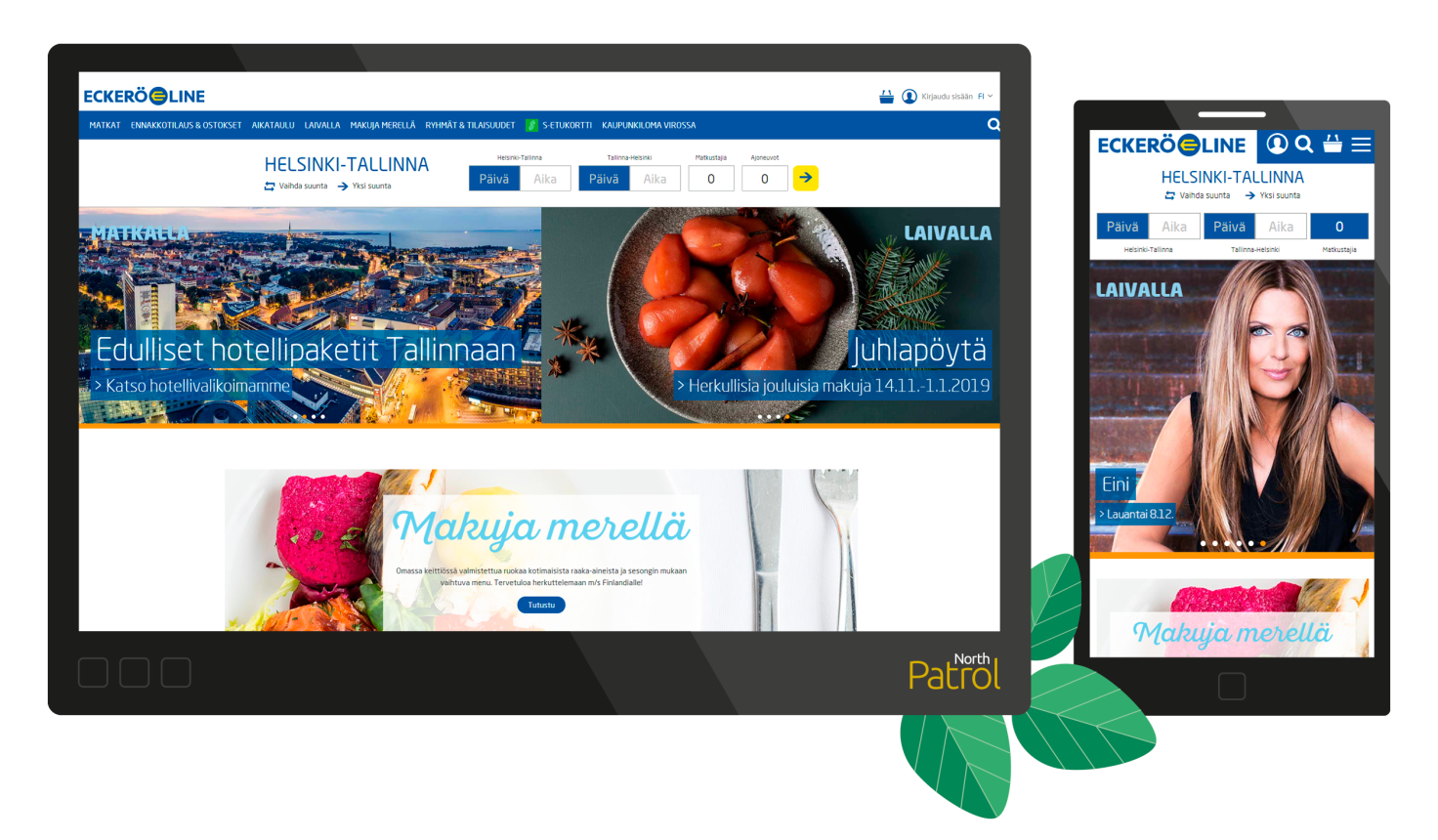The web store requirements of Eckerö Line are very complicated. Similarities with typical consumer web shops cannot really be found. Already, the cruise and route trip sales have many dimensions and when enhanced with different kinds of extra services onboard, such as meals and vehicle shipping, and services in the destination, such as hotel accommodation and opera tickets, managing different kinds of combinations becomes really complicated. An extra spice is the pre-order selection, which comes with its own set of rules.
North Patrol is a consulting firm specialized in the design of digital services and information systems. We shape ideas into a vision and service concept, find the best architectural and technological solutions, design a functional user experience, and compete to find the ideal partner for implementation work. We do not sell implementation projects, nor do we sell licenses; we are genuinely on the side of the customer.

The goal of Eckerö Line is to provide as good customer experience as possible throughout the service channels. The web store plays a remarkable role in this, so taking care of the combinations described earlier is not enough, but the available choices must be presented for different kinds of end users clearly as a part of a seamless customer experience. Naturally, different kinds of devices must be considered at all times.
We interviewed Petri Hannikainen who is the eCommerce Manager at Eckerö Line. He told us about the web store project.
The implementation project succeeded on the second try
The previous version of Eckerö Line’s web store was implemented by using IBM WebSphere Commerce 6, which had been heavily tailored over the years. An essential background system where the web store was tightly integrated was the reservation system CarRes provided by Carus. It was clear that the reservation system would remain the same also in the future, but a modern, more agile and flexible solution was needed for the platform of the web store. Also, reducing the annual running costs was an objective.
Eckerö Line started the web store renewal project already two years earlier. At the time, the goal was to be able to use the same technology platform in all the corporate companies, but afterwards it was found out that the selected platform simply could not respond to the requirements of Eckerö Line. The project was permanently canceled after a long struggle.
After this experience, Eckerö Line wanted to make the upcoming platform selection carefully. North Patrol was selected as an independent partner to support the selection process. From all the possible technology choices, Magento was selected as the platform. The risks related to the change in the Magento ecosystem were recognized very well, but still the product seemed to be the most suitable choice for identified needs.
The platform selection has proven to be very successful. “Our own team which works with Magento in practice, has adopted the platform very well. The previous web store was filled with different kinds of tune-ups. Now necessary tasks can be carried out by using just one tool. The basic capabilities of Magento are incredibly good”, Petri tells. As an example of a good functionality he mentions BlueFoot extension which is used for content management and which is going to be the official content editing tool of Magento in the near future.
Of course, some compromises have been done, and not all the capabilities of the previous web store platform were even tried to be implemented. Some customizations, for example for the check out process, have been done and numerous individual problem-solving situations have been met, but all in all the satisfaction to Magento has been very high.
Digia was selected as the implementation partner, which appeared to be a very good choice. The previous supplier, Igence, was merged with Digia during the selection process. Eckerö Line was satisfied with Igence who knew the business and the information systems of Eckerö Line already. Digia, on its own behalf, managed to convince Eckerö Line with their comprehensive knowledge and total offering. Co-operating with a bigger supplier has always benefits, said Petri:
“We get a lot of different kinds of support from Digia. They can help us extensively in any web store related question from hardware related things to conversion optimizing. Also, the service design team in the beginning of the project and later the quality assurance team have brought us significant value.”
Launching the web store just before the main season was successful
Summer is by far the most important season in the ferry business. The success during the summer months defines largely the commercial success of the whole year. In the sense of the information systems this means that all systems need to be stable and reliable during the main season. Surprises may have significant consequences to the business.
From this point of view, the launch of the new web store of Eckerö Line was a big risk. The project took more time than expected, and the new web store was launched only just before the main season in May 2018.
The risk was recognized, but taking the risk was worthwhile. Now the new web store has been used for nearly half a year. Customers have given positive feedback, and so far, the results have been great. From the beginning of the May until the end of the September the turnover grew 58% compared to the same period last year. Also, the conversion rate grew 48% when reflecting to the same time period. “Actually, all the essential KPIs have developed very well. Of course, there are also other things than the web store that have influenced to the success”, tells Petri referring to for example the ferry time table model that was changed in the beginning of the year which has significantly raised the number of passengers of Eckerö Line.
Encouraged by the good reception, the investments to the further development are currently big. “We go ahead with full throttle”, as Petri expresses it. The dedicated in-house team for Eckerö Line is developing the web store continuously further. Future development ideas are dealing for example with developing dynamic pricing, better targeting and making use of marketing automation. Also, new products will be added into the web store and the capabilities of artificial intelligence are continuously studied. Eckerö Line has lots of development ideas especially about targeting but utilizing detailed profiling and segmenting has found out to be difficult. “We should be able to log visitor’s behavior in more detail, but in practice this is surprisingly difficult” tells Petri.
Hints for a complex web store project
Even though the business model of Eckerö Line is almost unique, we asked hints from Petri about what should be emphasized when planning and implementing a complex web store. He said that three things in this project were above others:
- Testing: “When looking back, we should have emphasized testing even more than we did. Even though we tested a lot, we should have performed more different kinds of end-to-end scenarios. Testing should have been done more often with actual devices. Simulating the mobile devices is not enough. It is a good idea also to reserve a lot of time for testing.”
- Importance of a pre-project: “Before starting the technical implementation project we had a comprehensive phase for refining the specifications, which clarified things for both parties: supplier and ourselves. Already before this phase we had an exhaustive contract negotiations. Therefore, it was clear for both contractual parties what will be done and how before the actual programming was started.”
- Continuity: “It is beneficial to think the web store development as a continuum rather than an independent project which has a start and end. It is beneficial to adopt a paradigm that when a development project of this size starts moving it will never stop. Therefore, launching the web store is only one milestone on the roadmap.”
“Compared any previous projects, in which I have participated, this was very well managed all the time” praises Petri the supplier.
Project information
Eckerö Line
Technology platform: Magento 2
Procurement price range: 500 000 – 750 000 €
- May – June 2016: Technology comparison and platform selection (North Patrol)
- September – October 2016: Negotiations and demos with potential providers, procurement and selection of supplier (North Patrol)
- January – June 2017: Pre-project – Refining the specifications (Digia)
- June 2017 – April 2018: Technical implementation (Digia)
- April 2018: Launch of the new web store


